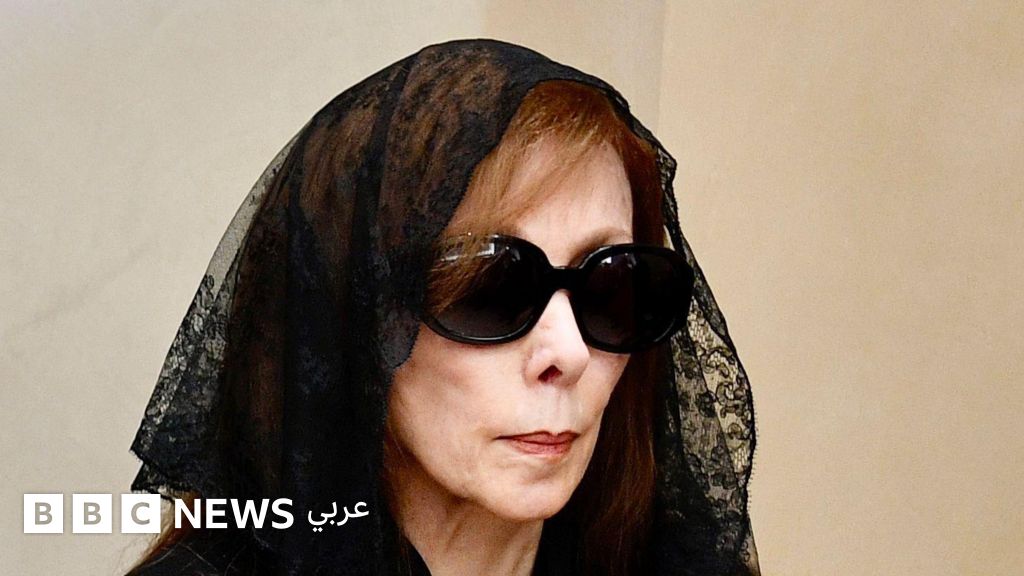Photo released, EPA/Shutterstock
On Monday, Lebanon bid farewell to his playwright and musician Ziad Rahbani, who died on Saturday at the age of 69, and large fans of his fans gathered in the morning in front of a hospital in Beirut to keep pace with the transfer of his body to a mountainous area northeast Beirut in which his burial ceremony will be held in the afternoon.
More than a thousand Rahbani fans gathered in front of the BMG Hospital since the early morning hours after they shouted on social media and chat groups.
A number of them brought white, red and flowering bouquets, and others carried pictures of Al -Rahbani, which were written on some of them, “No, nothing … I love you,” referring to the name of one of his songs.
Lebanese have repeated calls for social media in the past two days, “by announcing the national mourning and setting the Lebanese media due to the status of the late.”
The attendees exchanged condolences, while the late tunes and his voice were shouted through cars that were passing through the street, then a group of participants fly and sang the songs of the late, including “for the first time, what they are Sawa”, the first composer of his mother Fairuz.
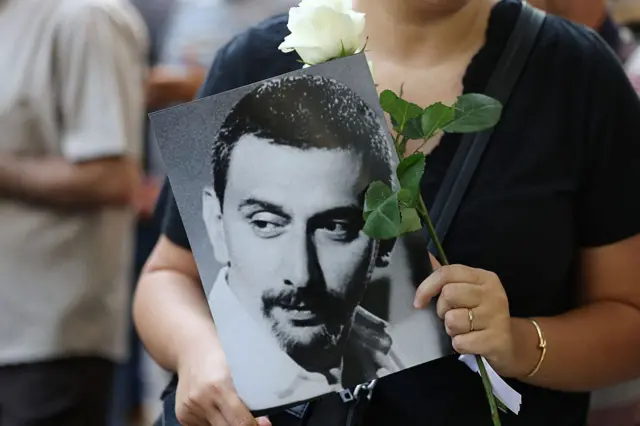
Photo released, AFP VIA Getty Images
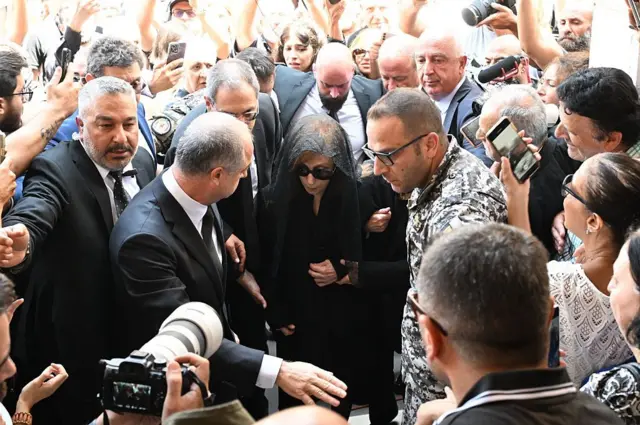
Photo released, Anadolu via Getty Images
Pictures of the funeral shows a picture of the Lebanese actress, Carmen Labs, as she shed tears on the coffin of Ziad Rahbani during his funeral ceremony in the Church of the Roman Orthodox Lady in Bikfia. Lops and Ziyad collected a love relationship, according to what I mentioned in an interview.
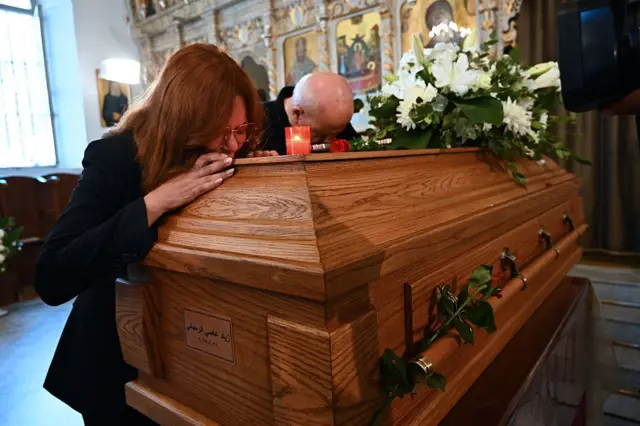
Photo released, AFP VIA Getty Images
Upon the exit of the car designated for the transport of the body from the hospital, the applause was made on the impact of the bells of the church of the region, and the attendees, many of whom were crying, were crying over the flowers and rice, and they fired the Zagarid, as well as others from the balconies of their homes in this area that Rahbani lived close to, and held his studio in it, and spends his time in its cafes and bars.
Some demanded that the coffin out of the car to enable the gathering to throw the last look at it, carry it and circumambulate it in the dear area of the late heart.
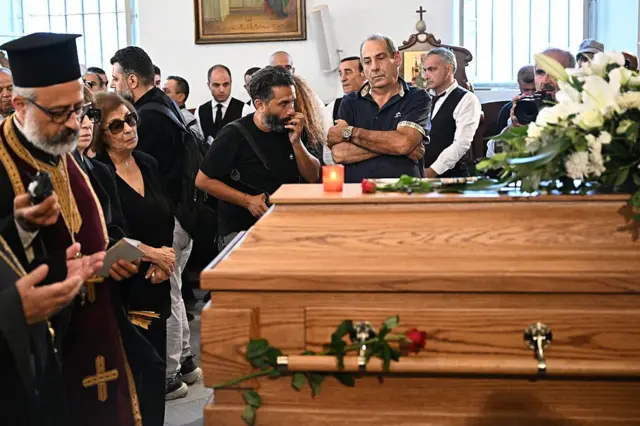
Photo released, Getty Images
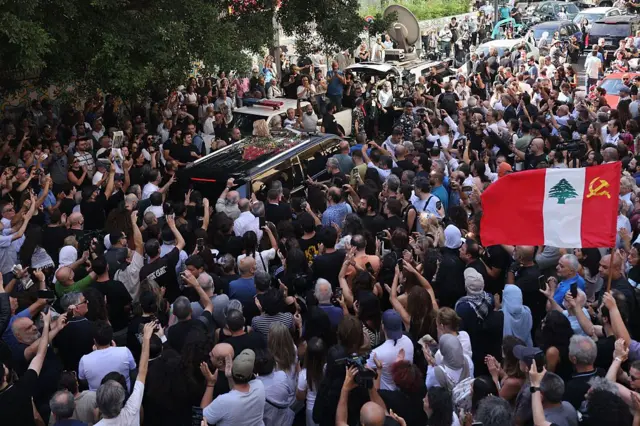
Photo released, AFP VIA Getty Images
France Presse quoted the Secretary -General of the Lebanese Communist Party, Hanna Gharib that Ziad “is a revolutionary artist who carried the issue of humanity (…) and he wanted Lebanon, democratic, secular and sectarian.”
A number of participants raised the Palestinian flag, and others put on their Kufic shoulders, in a salute to the late, who was famous for his support for the Palestinians.
Some carried a poster with the signature of “Friends of the Fighter George Abdullah”, which combines the image of Rahbani with the image of the pro -Palestinian activist, who returned on Friday, the day before the artist’s death, to his hometown in northern Lebanon, after spending more than 40 years behind bars in France to condemn him with collusion in the assassination of American and Israeli diplomats in the eighties of the last century.
This page contains content from the X. Your approval is required before displaying any materials because it may include correlation files (cookies) and other technical tools. You may prefer to see Correct file policy X And privacy policy Before approval. To view the content, choose “approval and completion”
Warning: BBC is not responsible for the content of external sites
End x sharing, 1
This page contains content from the X. Your approval is required before displaying any materials because it may include correlation files (cookies) and other technical tools. You may prefer to see Correct file policy X And privacy policy Before approval. To view the content, choose “approval and completion”
Warning: BBC is not responsible for the content of external sites
End x sharing, 2
“I came because I considered myself a generation of Ziyadi (…) Rahbani contributed to the formation of our revolution and building our political awareness and our personality. Loss,” said theater actor Ziad Itani, who was involved in the gathering.
“My mother called me his name after one of his plays,” he added.
Rahbani was famous for his plays that he produced during the Lebanese Civil War (1975-1990) and mocked it from a highly complex social political reality. Despite his declared political affiliation, he was very popular among all groups of the Lebanese people.
And whoever was unable to attend these actions in the western part of Beirut, where Ziyad was residing, due to the division of the Lebanese capital at the time between the two parties of the conflict, listened to its records on the cassette tapes that were widely spread, and the residents of the Eastern Beirut loyal to the political and military camp facing the left parties, memorizing the texts of these plays by heart.
This page contains content from the X. Your approval is required before displaying any materials because it may include correlation files (cookies) and other technical tools. You may prefer to see Correct file policy X And privacy policy Before approval. To view the content, choose “approval and completion”
Warning: BBC is not responsible for the content of external sites
End x sharing, 3
Ziad Rahbani, born on January 1, 1956, began his artistic career in the early seventies of the twentieth century with the “Sahriya” play, and his criticism of his traditional and folk parents did not survive.
His plays in the 1970s and 1980s won great success, in which the problems and sects of Lebanese society were shortened, which were nourishing the fire of the civil war.
Many songs composed, a large part of it for his mother, Fayrouz, and for other artists who worked with him.
The departure of Ziyad Rahbani was one of the most circulating topics on social media platforms in Lebanon and the Arab world in the past two days, as dozens of celebrities of art, culture and media published with them thousands of other users, letters in which the artist “Genius” inherited. It was also widely circulated with videos of his works and interviews.


